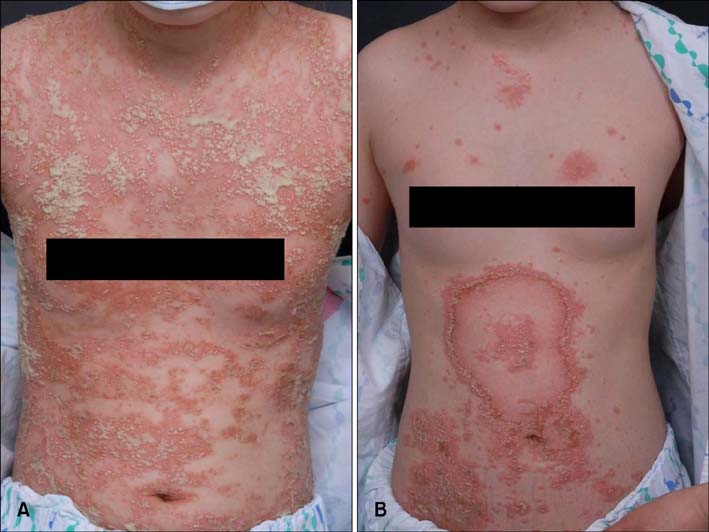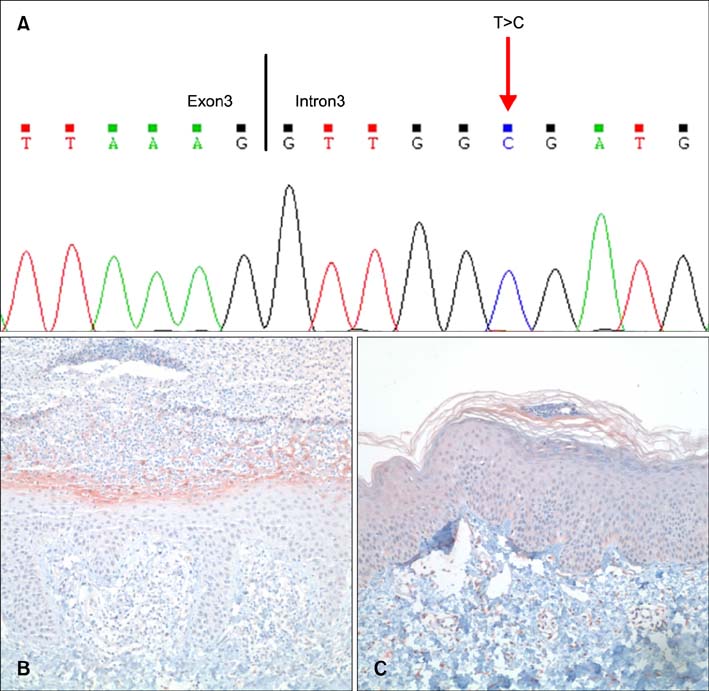Ann Dermatol.
2014 Jun;26(3):424-425.
Gene Mutation Analysis in a Korean Patient with Early-Onset and Recalcitrant Generalized Pustular Psoriasis
- Affiliations
-
- 1Department of Dermatology, Ajou University School of Medicine, Suwon, Korea. esl@ajou.ac.kr
- 2Department of Microbiology and Immunology, Ajou University School of Medicine, Suwon, Korea.
Abstract
- No abstract available.
MeSH Terms
Figure
Reference
-
1. Griffiths CE, Barker JN. Pathogenesis and clinical features of psoriasis. Lancet. 2007; 370:263–271.
Article2. Marrakchi S, Guigue P, Renshaw BR, Puel A, Pei XY, Fraitag S, et al. Interleukin-36-receptor antagonist deficiency and generalized pustular psoriasis. N Engl J Med. 2011; 365:620–628.
Article3. Onoufriadis A, Simpson MA, Pink AE, Di Meglio P, Smith CH, Pullabhatla V, et al. Mutations in IL36RN/IL1F5 are associated with the severe episodic inflammatory skin disease known as generalized pustular psoriasis. Am J Hum Genet. 2011; 89:432–437.
Article4. Farooq M, Nakai H, Fujimoto A, Fujikawa H, Matsuyama A, Kariya N, et al. Mutation analysis of the IL36RN gene in 14 Japanese patients with generalized pustular psoriasis. Hum Mutat. 2013; 34:176–183.
Article5. Debets R, Timans JC, Homey B, Zurawski S, Sana TR, Lo S, et al. Two novel IL-1 family members, IL-1 delta and IL-1 epsilon, function as an antagonist and agonist of NF-kappa B activation through the orphan IL-1 receptor-related protein 2. J Immunol. 2001; 167:1440–1446.
Article
- Full Text Links
- Actions
-
Cited
- CITED
-
- Close
- Share
- Similar articles
-
- Early Onset Generalized Pustular Psoriasis Accompanying IL36 Receptor Antagonist (IL36RN) Gene Mutation in a 14-year-old Korean Male Patient with No Family History
- Two Cases of Combined Geographic Tongue and Fissured Tongue in Generalized Pustular Psoriasis
- A Case of Annular Pustular Psoriasis Showing Features of Subcorneal Pustular Dermatosis
- A Case of Generalized Pustular Psoriasis Improved with Isotretinoin
- A Case of Annular Pustular Psoriasis



